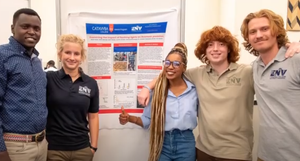
This was a rare opportunity for Catawba undergraduate students to work on a real-world wildlife conservation problems and present their results to an international audience. The students created a poster, with KWT as co-authors, was presented at the International Congress for Conservation Biology conference which the group attended.
An ongoing problem in Kenya (and in many parts of the world) is the effect of wild predators on livestock. Predators include lions, leopards, and hyenas, among others. Most such predators are active at night, so some people have used flashing lights at night to deter predators from attacking livestock. KWT did a study where they gave some households flashing lights and then compared the number of livestock killed by predators at those households with the number of livestock killed at other households that did not receive lights. The Catawba team summarized and analyzed the data provided by KWT. They found that the lights significantly reduced the number of livestock killed by predators. They also reviewed a lot of published studies on predator deterrence techniques. The group then created a poster to share these details at the scientific conference.
The trip also included visits to Volcanos National Park to see Mountain Gorillas and Akagera National Park to see large animals of the savannah such as giraffes, elephants, and rhinos.
Special thanks to Catawba student Brian Kaelo who worked with KWT before enrolling at Catawba and helped establish the connection that allowed the collaboration to occur.
Learn more about the students' trip to Rwanda below:
